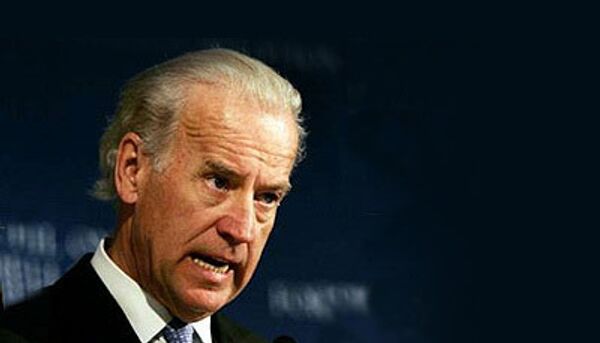MOSCOW. (RIA Novosti political commentator Andrei Fedyashin) - On October 23, U.S. Vice President Joe Biden completed his tour of Eastern Europe, paying visits to Poland, Romania and the Czech Republic.
Before the tour, and at every one of its stops, Mr. Biden's press service denied the claim that his mission was to reassure the governments in Warsaw and Prague, which President Obama recently excluded from the Bush administration's European plans for missile defense. So much so that, by the end of Mr. Biden's visit, no one had any doubts about the vice president's actual goals.
These visits were made exactly a month after Obama announced that plans for the missile defense systems in Poland and the Czech Republic would be radically changed. Mr. Biden didn't have any particular mission in Romania, but without a visit to Bucharest the vice president's visits to Prague and Warsaw could have been interpreted in only one possible way.
Everyone understands that Warsaw and Prague - or at least certain representatives of the Polish and Czech establishment - feel as that they risked a lot by trusting American promises for missile defense, and that now the Americans have not met their expectations.
The situation with Prague is especially complicated, something Mr. Biden attempted to improve somewhat by meeting with President Vaclav Klaus and Prime Minister Jan Fischer. Mirek Topolanek, who signed an agreement with the then U.S. Secretary of State Condoleezza Rice to deploy an American radar unit near Prague area, has since lost power after a parliamentary vote of no confidence in March. The new cabinet of Jan Fischer is openly acknowledged as transitional, and lacks the support in parliament essential to conclude strategic agreements with the United States. In May, the Czech Republic is going to hold general elections.
Mr. Topolanek must be the one who has suffered the most from Obama's change of course on missile defense. Mr. Topolanek's government agreed to deploy American radars despite the protests of the majority of the Czech population, including the opposition. Had he not made this decision, Mr. Topolanek could have avoided the vote of no confidence.
In fact, on October 23, the former Czech prime minister issued a special statement demanding that Biden "clearly explain the reasons that led the Obama administration to its decision not to build a radar in the Czech Republic." The decision on the part of the Obama administration, he added, raises questions about "whether the United States is stepping back from the region of Central and Eastern Europe in exchange for better relations with Russia."
It must be said that Warsaw and Prague have always gotten on the Bush administration's nerves by insisting that Russia be taken into account when developing plans for missile defense. During the whole missile defense saga, Washington sought to assure Moscow that this system was not intended against it; rather, it was a means of securing the world against the unpredictable Iranians. However, the Polish and Czech governments argued they needed the missile defense shield to protect their countries from Russia's "neo-imperialistic ambitions."
In all three capitals, Mr. Biden had to explain that the U.S. would abandon neither its defense commitments, including both through NATO obligations and bilateral agreements, nor the strong friendship with the three governments. Now there will just be a new political order in which Russia's interests hold more weight than under the Bush administration.
Judging by the recent visits of the 64-year-old Biden (he recently visited Tbilisi to calm down Saakashvili and then the Balkans), it seems that his mission is to provide comfort to the distressed. Before the presidential election, the former chairman of the Senate's Foreign Relations Committee was unanimously called the Democrats' leading foreign policy expert and a foreign policy guru. It must be noted that in the U.S., the notion of foreign policy expertise has a slightly different meaning than in Europe. To earn that title, an American foreign policy expert need only be able to distinguish European countries and world regions, pronounce their names, and have a basic understanding of the general nature of the global trends and regional issues.
Mr. Biden's foreign policy beliefs are defined as "liberal interventionism," but one can hardly call the senator's foreign policy positions consistent. Sometimes it is even hard to make out the difference between his foreign policy position and that of the Bush administration's, except for minor distinctions in details and timelines.
However, Mr. Biden is a master of persuasion, maybe too masterful. Each of Mr. Biden's speeches is a headache and puzzle for his staff. It would be okay if the senator were just a little too talkative, but the problem is that he enjoys talking for so long and in such detail that even in Congress he was called an "unguided missile" or someone who "lacks the filter." Mr. Biden's colleagues and aides become especially nervous when the senator starts his speeches with the phrase "I'll be brief," which usually means that he will diverge so significantly from the original point of the speech that he may even forget what exactly the original speech was about. This has happened with Mr. Biden more than once. He has sometimes talked such drivel that, having argued for a certain position at the beginning of the speech, he appeared an advocate of its exact opposite in the end.
"Joe often didn't know what he thought until he had to say it," noted American researcher Richard Cramer, who analyzed presidential candidates' psychological states during the 1988 election, when Mr. Biden unsuccessfully sought a Democratic nomination.
However, there are situations when Mr. Biden is brought into play, for instance to heal the wounds of upset allies.
The opinions expressed in this article are the author's and do not necessarily represent those of RIA Novosti.



